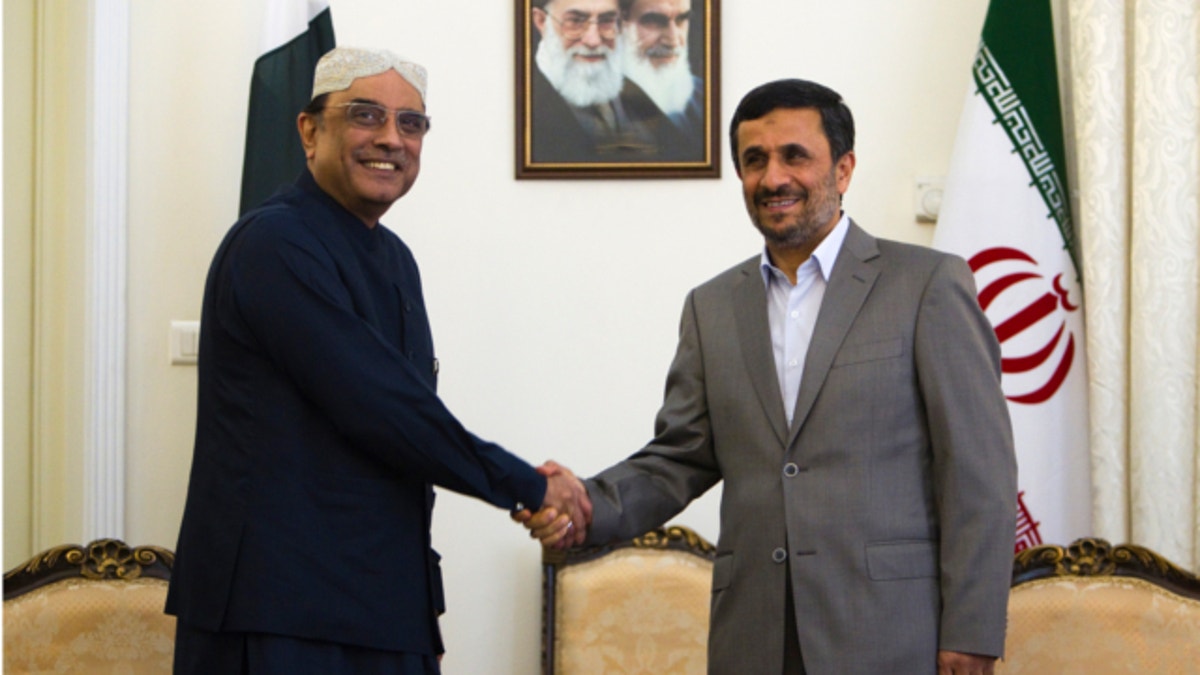
July 16, 2011: Iran's President Mahmoud Ahmadinejad (R) shakes hands with his Pakistani counterpart Asif Ali Zardari during a meeting in Tehran (Reuters)
Pakistan says it is determined to build a gas pipeline with Iran despite the threat of U.S. sanctions for the move -- with a top Pakistani official suggesting the uncertainty in U.S.-Iran relations is a deciding factor.
“Can America guarantee us that they will never make friends with Iran?” Asim Hussain, adviser to the Pakistan prime minister on petroleum and natural resources, told Fox News. “Will Iran never come to terms with the world order? And if someone can give us that guarantee then we will not [build] that infrastructure."
However, with the window still open -- though barely open -- for improvement in Iran's diplomatic standing, Pakistan presumably isn’t willing to stop laying the infrastructure for the gas pipeline, as officials claim Pakistan is a depleted nation facing a chronic energy crisis.
Pakistani President Asif Ali Zardari and his Iranian counterpart, President Mahmoud Ahmadinejad, are scheduled to inaugurate the gas pipeline project near the Pakistani border town of Gabd, Baluchistan, on Monday. Many head of states and foreign ministers have been invited to attend the ground-breaking ceremony, but Iranian diplomats and Pakistani officials in Islamabad declined to share the names of the dignitaries.
Both countries also will sign a memorandum of understanding to build Pakistan’s largest oil refinery at the southwestern port city of Gwadar costing $4 billion. Pakistan hopes that this may prompt China, which was granted a contract last month to run the port through a state-owned company, to join the gas pipeline project and partner in building the refinery.
Pakistan’s Foreign Office spokesman told Fox News that China hasn’t shown interest in the gas pipeline project, however Iran agreed to provide Pakistan with $500 million for construction of a third of the total length of the pipeline, which an Iranian company will undertake.
Washington strongly opposes the project, as it tries to cripple Iran economically for continuing its controversial nuclear program, suspected of developing atomic weapons. Though Tehran disputes that charge, the U.S. and its allies say Iran hasn't provided sufficient evidence that its nuclear program is for peaceful purposes.
The U.S. State Departments says it has made it absolutely clear to the Pakistanis that if the pipeline deal is finalized, it would raise serious concerns under the Iran Sanctions Act.
“Pakistan has a lot of energy requirements. We are working with them in close partnership on other, better ways to meet those needs," State Department spokeswoman Victoria Nuland said Thursday, responding to Fox News at a press briefing. She added that Iran has proven to be an unreliable partner again and again, suggesting Pakistan should discard the project.
The United States has been aiding and assisting Pakistan to overcome its energy deficit by supporting large-scale turnkey projects through renovation and modernization of power plants and building new dams.
But Pakistan says what its getting is not enough. According to the Ministry of Petroleum, the projects haven’t taken off and the completion time frame is not suitable to them.
“If you talk of giving something after 10 years, does not make sense to us,” says Dr. Hussain. He continued, “We need immediate gas, and we were not helped in getting LNG (liquefied natural gas) in any way.”
For Pakistan, the shortest and easiest way to get the LNG supply in the country is Iran, and Pakistani officials aren’t willing to abandon the project under U.S. pressure, even with sanctions possible.
Nuland said moving forward in that direction would cause sanctions to kick in, but Pakistan thinks the U.S. ultimately will grant a waiver similar to the ones it has granted to India, China, and Turkey, all of which import oil from Iran.








































